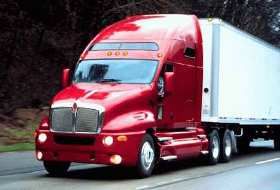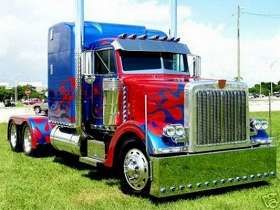Doubles & Triples???
Topic 11274 | Page 2

I'm trying to get my foot in the door of some doubles as a linehaul driver. For a shot at making a linehaulers salary, I'm up for the challenge.
How much does it really take though? I posted a post a while back about hitting animals where I saw a driver on I-70 in Kansas smash a deer and jerk the wheel at 60-65mph and managed to stay upright. And if my 10+ year old memory serves me right, I do believe it was doubles. The trailers did come up on two wheels though, and I thought he was going over, but didnt.
So are they really THAT touchy?
They seem to look fine driving down the highway. Not calling it "easy" by any means, just saying.
Honestly, I've pulled both vans and doubles, and there are perks and drawbacks to both.
In regard to wind, your tail can shimmy a bit, but that's more so if you're pulling empties. The wind goes through both your trailers, so you actually can have less overall swaying from wind, as opposed to pulling just a single empty van.
Snow or rain can impact doubles differently than a van, for better or worse.
Ice is ice, no matter how many axles you have.
Like I said, there is nothing to fear with pulling doubles, it just takes a different skill set. As I mentioned, over-steering or sawing the wheel tends to trouble more drivers that are inexperienced with pulling doubles - over-steering and over-braking. Work on these two potential pitfalls, and you'll be fine.
I love pulling doubles. Yes, it can be a little more nerve racking when in high winds or on slick surfaces, but it is nothing to fear. All equipment should be respected.
"Over-braking"- not sure of your meaning. Is it being careful slowing down, so you use the brakes less? Is it looking ahead with proper following distance (maybe more than regular following distance), so you do not slam on brakes? Maybe never using brakes on curves? Maybe all of these?
A tanker driver told me he's constantly riding the brakes, in dense traffic areas. I believe he meant, he's very careful, and probably drives slower.
I appreciate the explanation on over-steering. Did not know that.
Linehaul:
Linehaul drivers will normally run loads from terminal to terminal for LTL (Less than Truckload) companies.
LTL (Less Than Truckload) carriers will have Linehaul drivers and P&D drivers. The P&D drivers will deliver loads locally from the terminal and pick up loads returning them to the terminal. Linehaul drivers will then run truckloads from terminal to terminal.Doubles:
Refers to pulling two trailers at the same time, otherwise known as "pups" or "pup trailers" because they're only about 28 feet long. However there are some states that allow doubles that are each 48 feet in length.
OWI:
Operating While Intoxicated

Animal lovers kill me. I dont purposely want to kill anything,but if it crosses the road,its going to meet its death..not me.

Animal lovers kill me. I dont purposely want to kill anything,but if it crosses the road,its going to meet its death..not me.
I haven't started my trucking career YET. I'm a new "empty nester" and can't wait! I've long known that I have to change my stance on animals while driving that big rig... I'm the type to slow/stop for squirrels, cats, dogs, kids. You name it. What can I say? If God created it, I love it! This comment made me laugh (mostly at myself), but it's most definitely the truth.




Animal lovers kill me. I dont purposely want to kill anything,but if it crosses the road,its going to meet its death..not me.
I haven't started my trucking career YET. I'm a new "empty nester" and can't wait! I've long known that I have to change my stance on animals while driving that big rig... I'm the type to slow/stop for squirrels, cats, dogs, kids. You name it. What can I say? If God created it, I love it! This comment made me laugh (mostly at myself), but it's most definitely the truth.
Not 100% of the time...
If you can SAFELY avoid an impact with a large animal (with distance and a lower speed on your side)...it's a wise decision that will likely save your company a repair bill and the possibility of down time for the driver. If a deer unexpectedly runs into your path on the interstate , your only choice is to run over it. Hang-on for the ride, do not swerve and do not brake. Braking transfers weight to the steers...and increases the likelihood of additional front-end damage and/or possibly loosing control. Swerving...rather self-explanatory. Common sense applies.
Case in point: I was on I-81 South of the I-80 interchange Saturday afternoon, returning empty to the DC, when I encountered a rather large, intact deer carcass that partially blocked the left hand side of the RH lane I was in. I had plenty of time to reduce my speed, put my 4-ways on and safely avoid running over the animal by gradually moving partially onto the paved berm. Had I hit the carcass I am quite sure significant damage would have occurred to the left front part of the hood/side, steer tire/wheel and axle. Maintaining control of the truck might also have been compromised after the strike.
Interstate:
Commercial trade, business, movement of goods or money, or transportation from one state to another, regulated by the Federal Department Of Transportation (DOT).
OOS:
When a violation by either a driver or company is confirmed, an out-of-service order removes either the driver or the vehicle from the roadway until the violation is corrected.
New Reply:
New! Check out our help videos for a better understanding of our forum features

















Preview:








 TT On Facebook
TT On Facebook
Honestly, I've pulled both vans and doubles, and there are perks and drawbacks to both.
In regard to wind, your tail can shimmy a bit, but that's more so if you're pulling empties. The wind goes through both your trailers, so you actually can have less overall swaying from wind, as opposed to pulling just a single empty van.
Snow or rain can impact doubles differently than a van, for better or worse.
Ice is ice, no matter how many axles you have.
Like I said, there is nothing to fear with pulling doubles, it just takes a different skill set. As I mentioned, over-steering or sawing the wheel tends to trouble more drivers that are inexperienced with pulling doubles - over-steering and over-braking. Work on these two potential pitfalls, and you'll be fine.
I love pulling doubles. Yes, it can be a little more nerve racking when in high winds or on slick surfaces, but it is nothing to fear. All equipment should be respected.
Linehaul:
Linehaul drivers will normally run loads from terminal to terminal for LTL (Less than Truckload) companies.
LTL (Less Than Truckload) carriers will have Linehaul drivers and P&D drivers. The P&D drivers will deliver loads locally from the terminal and pick up loads returning them to the terminal. Linehaul drivers will then run truckloads from terminal to terminal.Doubles:
Refers to pulling two trailers at the same time, otherwise known as "pups" or "pup trailers" because they're only about 28 feet long. However there are some states that allow doubles that are each 48 feet in length.